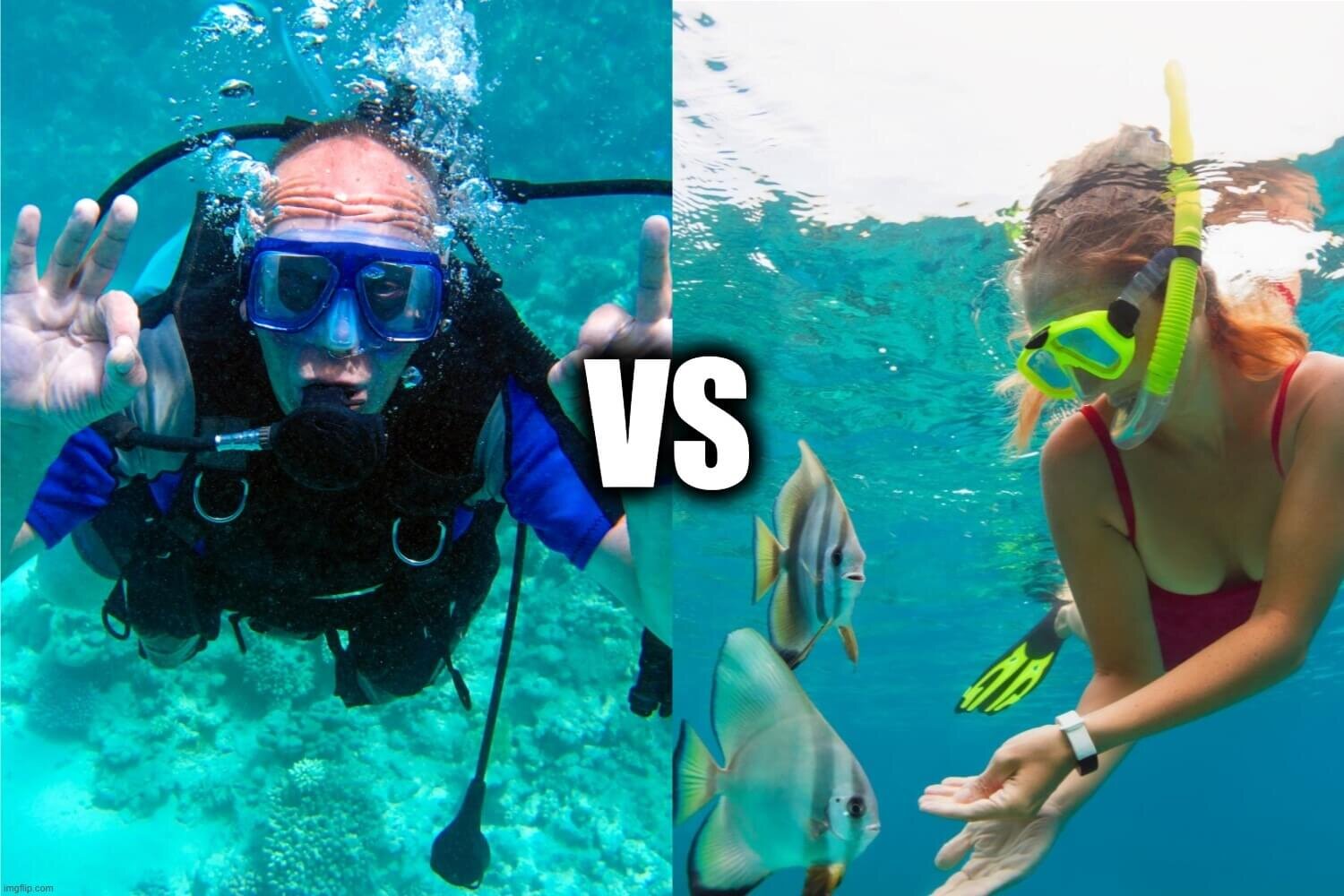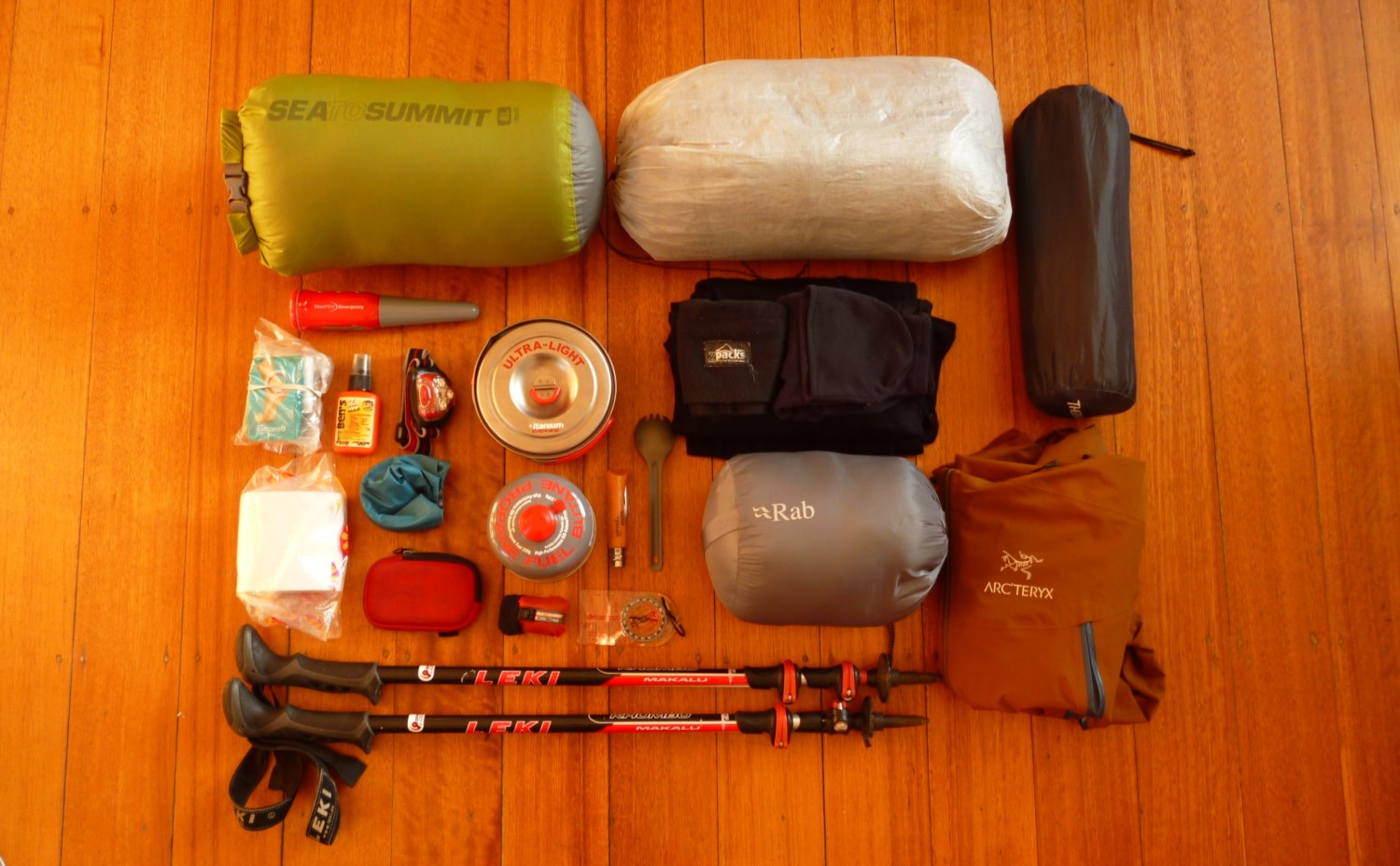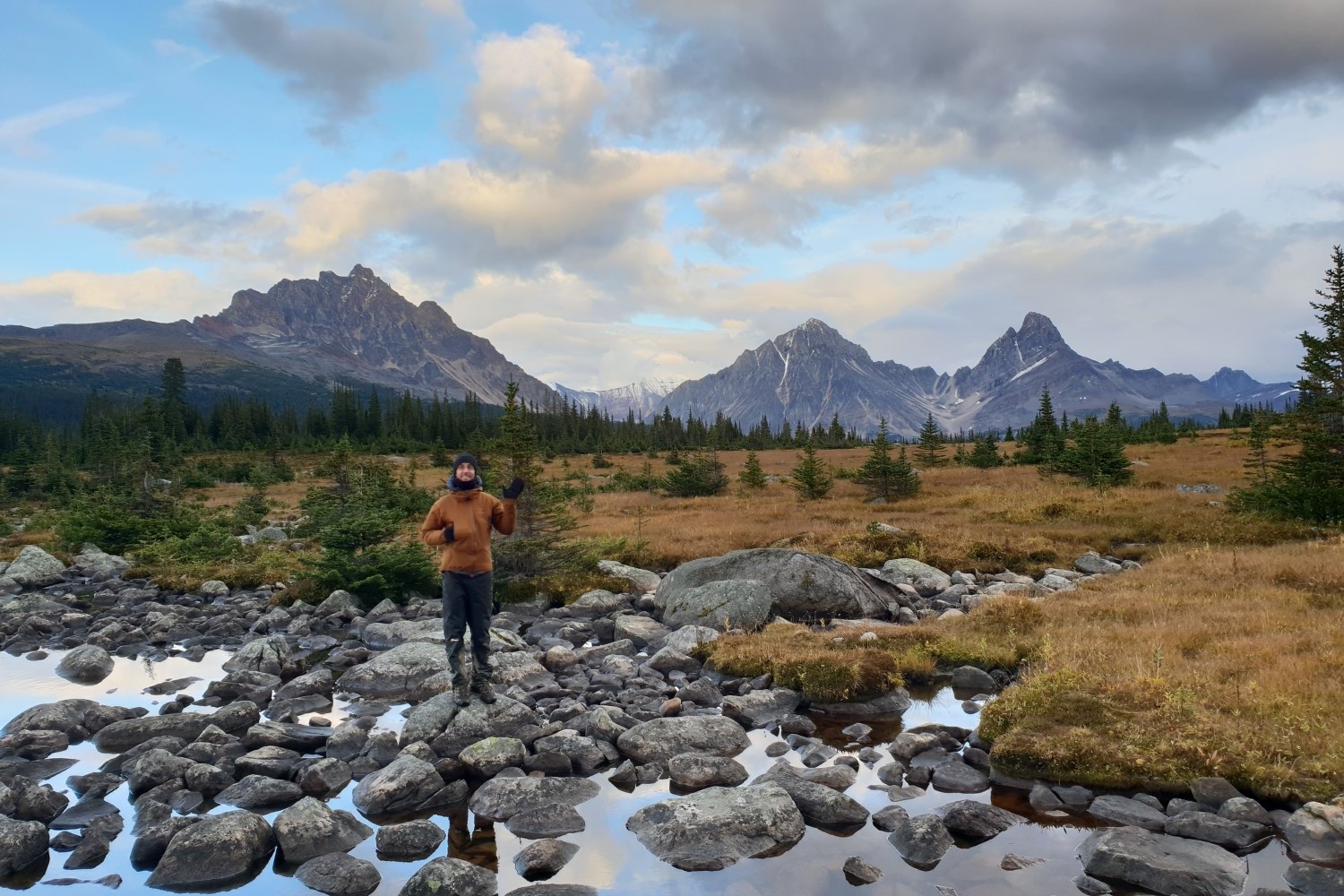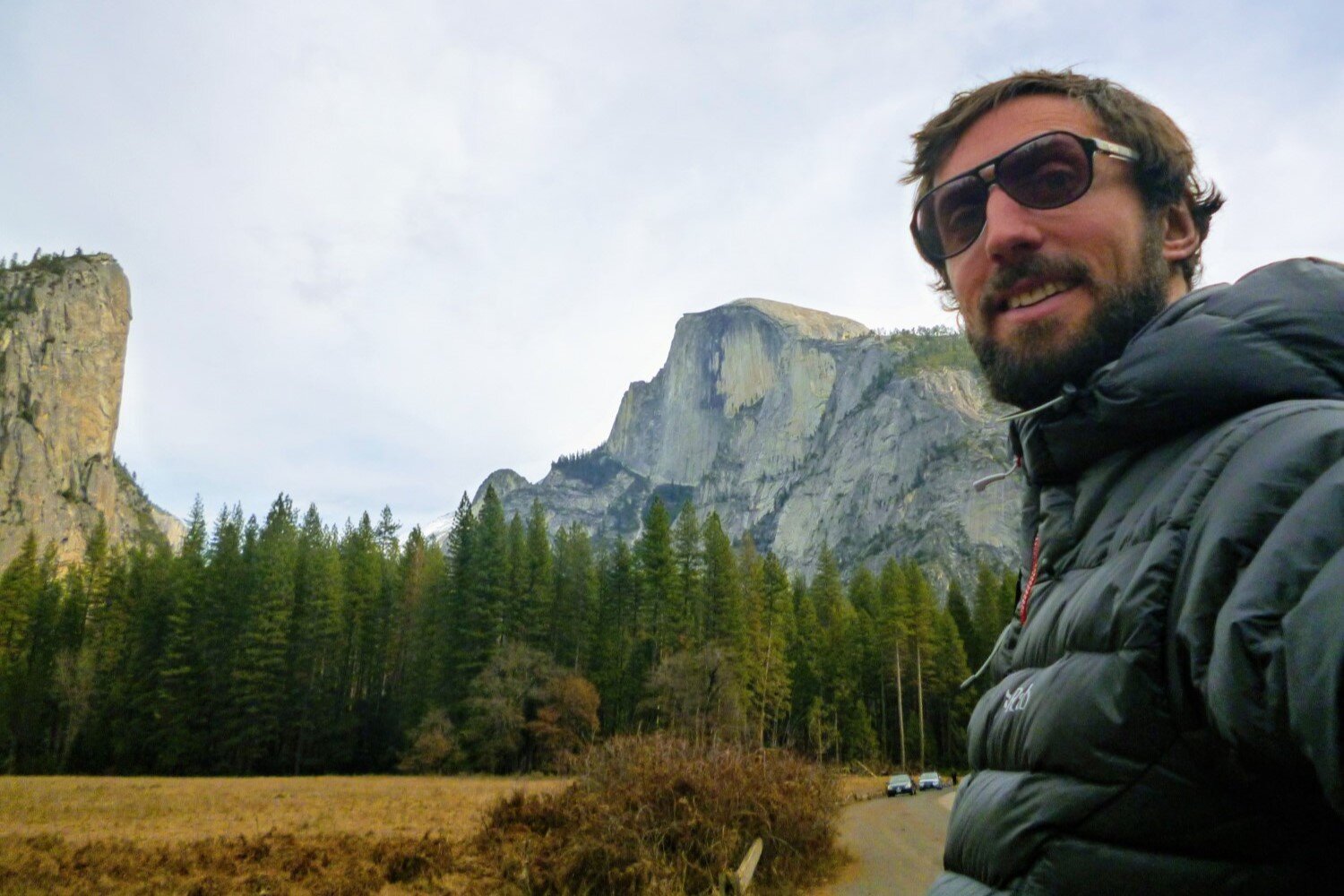Snorkeling vs Scuba Diving — WTF Is The Difference?
JUMP TO: THE QUICK ANSWERS / SNORKELING / SCUBA DIVING / SUMMARY
Author: Rose Martin
Snorkeling and scuba diving are both awesome activities that give you a unique chance to get up close and personal with the marine world.
Never-ending schools of tropical fish, impressive megafauna, vibrant coral reefs, sea kelp gardens, underwater caves, and abandoned shipwrecks are just some of the sights you can hope to explore on your watery adventures!
At first glance, snorkeling and scuba diving might seem pretty similar – they’re both heaps of fun, they get you in the water, and your mask forms a window to the marvels of the ocean – but there are some key differences too.
The main difference between snorkeling and scuba diving is your position in the water column – the domain of snorkelers is on the surface (mainly!) while recreational scuba divers are found anywhere from 5 to 30m beneath the surface.
Of course, there are other differences too, so let’s take a look at these and help you decide which activity is right for you. Spoiler alert: it might be both!
THE QUICK ANSWERS!
You may well have some specific questions or concerns when deciding which underwater experience to partake in! So before we dive a little deeper and fish through all the details, here is the quick and dirty of it…
WHICH IS BETTER?
This is a tough one to answer… and it ultimately comes down to personal preference. If you’re after a hassle-free holiday activity you can sign up for last-minute, then snorkeling is the way to go. But, if you’re after a more intimate marine experience, or love taking underwater photos, then you’re going to love scuba diving!
WHICH IS EASIER?
Although skilled divers make scuba look effortless, it certainly isn’t that way in the beginning – you need to study (and practice!) your skills, techniques, and safety procedures… and figure out how all that gear goes together. In contrast, with snorkeling, you can pretty much grab your fins and mask and go, even as a total beginner.
So once you’re trained up, scuba diving can be a very chilled affair. But for total newbies, youngsters, or those less technically minded, snorkeling is definitely the easier option – physically and mentally.
WHICH IS SAFER?
Snorkeling is generally considered the safer than scuba diving – you’re on the surface and breathing ordinary air, after all. But with proper training, scuba diving is also an extremely safe sport. Sure, it does come with inherent risks, but if you’re a responsible diver, you’re extremely unlikely to have any issues. Plus, snorkeling, like all water-based activities, has its own are safety considerations too.
WHICH IS BETTER FOR NON-SWIMMERS?
Although neither snorkeling or scuba diving requires super strong swimming skills, we reckon it’s snorkeling for the win for non-swimmers. Essentially, as long as you can float, you can snorkel. If you enter the water with floating devices, accompanied by a swimmer, then there’s no reason not to try out snorkeling just because you can’t swim.
Although it’s possible to try scuba diving without any swimming skills (for instance, with a PADI Discover Scuba Diving course), most training programs will require basic competency in the water – such as being able to float, tread water, or swim for certain lengths of time or distances.
WHICH IS MORE EXPENSIVE?
Scuba diving requires specialist gear and training, so it’s definitely the more expensive option. Plus, you’ll typically want a guide if you’re diving in a new area, and you might have to purchase additional medical insurance to make sure you’re covered for any mishaps.
Although many people also opt for guided snorkel tours on vacation, it’s also possible to simply grab your gear and head out for a quick snorkel without paying anyone anything. Plus, the lack of training and gear involved helps to further cut costs.
SNORKELING
For hundreds of years, people from all over the world have held their breath and swam underwater hunting for fish, pearls, and other marine treasures. These practices eventually inspired recreational snorkeling, which involves donning a mask, snorkel and, in most cases, fins, to explore the underwater world.
Snorkelers spend the majority of their time at the surface, although the more adventurous ones will duck down below the surface to get face to face with their fishy friends. It’s important to note that this differs to freediving, which focuses on maximizing time spent under the water and typically involves far greater depths.
Although it can become tiring if you’re out on the water for hours, or the sea is rough, snorkeling is typically a very laid-back affair. The fins propel you through the water super efficiently, making snorkeling far easier than regular swimming. In fact, the kicks are so efficient you don’t need to use your arms at all (which is great if you want a free hand for a camera).
Inclusive, easy, and affordable, it’s not surprising that snorkeling is one of the most popular sports around. So, let’s take a closer look at whether or not snorkeling is the sport for you!
What’s so good about snorkeling?
It’s super simple!
One of the best things about snorkeling has the be how simple it is – all you need is a few bits of lightweight gear and you’re good to go. You can easily pop these in your bag for ‘just in case’ if you’re heading to the beach or out on a boat trip.
Another great thing about snorkeling is that it’s limitless – you can hop in and out of the water for a quick snorkel as many times as you like in a day, you can snorkel for as long as you like, and you don’t have to worry about flying before or after the activity (unlike with scuba – but more on that later).
We also love that you don’t need super deep water to snorkel (3m is enough), so there are plenty of spots on the coast you can visit without having to hire a boat at all.
It doesn’t require specialist training or high levels of fitness
One massive advantage of snorkeling over scuba diving is the lack of specialist training required. Anyone with basic swimming skills can try it out, and it’s even possible for non-swimmers (in the right conditions and with the right supervision!).
It doesn’t require a great level of fitness either, and floats and life jackets can be used to make it even easier. Because of its simplicity, and the fact that it doesn’t require much physical exertion, anyone from kids to grandparents can enjoy snorkeling.
Because of its simplicity, snorkeling is a great activity for families — even those with younger kids!
It’s budget-friendly
The lack of technical gear needed for snorkeling makes it a very budget-friendly activity. Sure, high-end masks, snorkels, and fins can set you back a bit, but there are plenty of budget options out there too. Besides, you need all of these (and more) for scuba diving, so gear-wise snorkeling is definitely easier on the wallet.
On top of that, snorkeling requires very little (if any) formal training – at most you might want to shell out for a few lessons, but most people just jump straight in with more experienced friends or family.
For the most part, people tend to take themselves snorkeling straight off the shoreline (you only need around 3m of depth for an awesome snorkel), which is a very cost-effective method. However, if you want to head further afield, you’ll have to shell out for boat transportation and perhaps a guide to show you the best spot. These organized snorkel trips can come with pretty hefty price tags in some of the world’s top holiday destinations, but again, you’d probably pay double for a dive trip with the same tour operator.
Most of the time you can go snorkeling directly of the beach, making it far simpler and less expensive than many diving trips that require boat transport.
It’s less risky than scuba diving
As with all watersports, snorkeling comes with some inherent risks – currents, animal encounters, and boat hazards just to a name a few. However, if you follow basic safety procedures – like never snorkeling alone, supervising less confident swimmers, using boat support when needed, and checking the weather conditions – then snorkeling is a very safe activity.
And what’s not so good about snorkeling?
But as much as we love the stress-free simple nature of snorkeling, it does have some disadvantages compared to scuba diving.
Limited perspective
Snorkeling is predominantly a surface watersport, which can make it difficult to spot small creatures hiding on the ocean floor. It also means that when the visibility is bad, you might not be able to see much below you at all!
More experienced snorkelers often duck dive to get a closer look at life below the water, but this is typically only for a few seconds and then it’s back to the surface (unless you’re freediving, but that’s a different kettle of fish). Furthermore, some sites, like shipwrecks at 40m, will be inaccessible to snorkelers, yet scuba divers can explore them with ease.
Overall, this means that snorkeling gives you a somewhat limited perspective of the underwater world compared to scuba diving, and relies more heavily on good conditions for a trip to be worthwhile.
Harder to observe marine life
Duck diving is a fairly rapid movement that involves bending at the hips and using your arms to propel yourself under the water while raising your feet and kicking. Although this is a lot of fun, the noise and splashing does tend to ‘spook’ lots of marine life, causing it to swim away before you can get close.
This makes observing aquatic animals in their natural state difficult – you’re far less likely to witness their natural behaviors, such as mating, eating, or spawning because these activities will be interrupted by your sudden appearance.
Plus, even if you do manage to sneak up on something, sooner or later, you’re going to need to breathe. Annoyingly, the urge to breathe often presents itself just when you find yourself in the perfect position for that shot you’ve been waiting for – which can be a real pain for photography enthusiasts! Plus, as a snorkeler, you’re less stable in the water than a scuba diver, so surge and currents can also interfere with your photos.
SNORKELING PROS
Simple
Almost anyone can do it
Affordable
Less risky than scuba diving
SNORKELING CONS
Limited perspective
Affected a lot by poor visibility
Can spook marine life
Harder to get awesome photos
SCUBA DIVING
Scuba diving, unlike snorkeling, is an activity that takes place below the water. In the past, air was delivered to divers from the surface via large tubes but, thanks to technological advancements, divers now take their own air supply with them (SCUBA is actually an acronym that stands for ‘self-contained breathing apparatus’!).
People scuba dive for heaps of reasons – it’s used by the military, for science, for other commercial purposes… and, crucially, for fun!
Recreational scuba divers are uniquely placed to passively observe marine life, take awesome photos, and explore some awesome sites such as caves and shipwrecks – sounds pretty good doesn’t it?
It does, however, require some serious commitment, both financially and in terms of training. Although the technical side puts some people off scuba diving, for others, it’s all part of the fun. So, let’s delve a little deeper into the pros and cons of scuba diving to see whether it’s the sport for you!
What’s so good about scuba diving?
It’s a truly unique experience
Scuba diving is often likened to being in outer space – marveling at the wonders of the underwater world in a weightless state really is an out of this world experience! So, scuba diving should definitely be on the hit list of anyone looking for a mind-blowing adventure right here on our planet.
You can observe marine life intimately
One thing that some people don’t realize is that, once you’re in the water, scuba diving is a very relaxing activity. In fact, skilled divers try to move as little as they possibly can while they’re underwater. This is because, if you move around a lot, you’ll get through your air quickly and end up with a short dive (and, trust us, no one wants a short dive!).
By approaching marine life slowly and steadily, you’ll encounter marine creatures doing the weirdest things totally unperturbed by your presence (unlike when snorkelers suddenly duck down from the surface and spook all the fish).
Similarly, because your time isn’t limited by how long you can hold your breath, you can wait for magical moments to happen right in front of you. Many divers will find a nice spot, hook onto the reef, and wait for larger species to swim on by, perhaps on their way to mate or visit a cleaning station.
Great for underwater photography
These intimate moments make for awesome footage, so it’s not surprising that many photographers love to scuba dive. Although it’s possible to take photos while snorkeling, spooking fish, needing to breathe, and being unstable in the water all make getting that perfect shot that bit more challenging.
In contrast, divers have more time and are generally far more stable in the water. Not to mention you can invest in sound- and bubble-reducing gear to get even closer to marine life.
More to explore
Finally, it can be argued that there is simply more to see when scuba diving compared to snorkeling.
Recreational divers can dive as deep as 40m, which means there’s a huge choice of shallow and deeps sites to choose from. Although skilled freedivers can enjoy most of these sites too, most will be out of range for your average snorkeler.
Similarly, divers can explore tunnels, caves, and the insides of shipwrecks – places that just wouldn’t be safe for snorkelers.
Since divers have a larger underwater range than snorkelers they can explore many more underwater locations, such as shipwrecks.
A final point is that diving gets you closer to your subject, so you can have a good peer at those corals 15m below you even if the visibility is just 5m. In contrast, from the surface, you wouldn’t be able to see those corals at all. This means that snorkeling is more prone to cancellation (or just a poor experience) as a result of poor visibility than scuba diving is.
And what’s not so good about scuba diving?
Scuba sounds pretty good doesn’t it? But hold on, scuba diving isn’t all fun and games, there are some definite drawbacks compared to snorkeling too.
It can get pretty complicated
On top of the usual snorkeling gear (mask, snorkel, and fins), scuba divers also need to find themselves a buoyancy control device (aka a BCD – basically a jacket that you can inflate and deflate), a regulator (the part you breathe out of), a dive computer (not mandatory, but highly recommended!), and, of course, a tank.
Plus, there are all sorts of extras you might need depending on what kind of diving you’re doing. Some people love getting to know what does what but, for others, learning how all the gear works may get a bit too much. All that gear also means that any diving trip needs to be properly organized – no wandering to the beach with your gear in your bag ‘just in case’.
High pressure ports, low pressure ports, sidemount configurations, dive computers, yoke valves, DIN valves — there is no shortage of technical aspects to dive into for those that enjoy that part of the sport!
There are also lots of safety rules when it comes to diving that you need to understand and remember.
For instance, if you’re doing several dives a day, you need to keep an eye on your times and depths so you can calculate the time you need to spend on the surface to continue diving safely.
Another complication is that you can’t fly for certain time periods before or after dives, which means you might struggle to squeeze in your dives if you’re flying somewhere for a short trip. Snorkeling avoids both of these issues, and is definitely a simpler option overall.
It requires specialist training
Scuba diving requires technical gear, takes you deep underwater, and relies on breathing air that’s been compressed. So, it’s not surprising that it requires specialist training (in fact, we’d be worried if it didn’t!).
Plenty of organizations around the world offer internationally recognized diving qualifications, with the most famous ones being PADI and SSI. Courses start at the beginner level, and continue in stages all the way up to professional courses for people who ultimately decide to become scuba instructors.
Because of its technical nature, scuba diving does require specialist training — but there are many organizations around the world that offer internationally recognized diving qualifications.
Although most training bodies offer introductory diving sessions, if you want to become a certified diver who can dive for fun, you’ll need to complete a course.
The courses introduce you to the gear you’ll use, teach you how to problem-solve underwater, and come with some kind of physical requirement (e.g. the ability to float or swim for a certain time or distance). There are age limits too and, for certain courses, you must have logged a certain number of dives.
The need for formal training means scuba diving isn’t always possible on a whim and, if you’re on a short vacation, the training might take over your entire trip. For these reasons, some people prefer to stick with snorkeling, which they can do as and when they please.
It’s expensive!
Complex gear and specialist training racks up the cost of scuba diving compared to snorkeling.
You can save some money by purchasing your own equipment rather than renting, but it will cost you a lot. Plus, diving gear isn’t the easiest to carry around with you, so many people (even those with their own gear), still rent while they’re on holiday.
On top of that, you won’t be popping a tank in your suitcase, so you’ll need to hire one of those at the very least. Tour operators will charge more for dive trips than snorkel excursions too, – even if you’re visiting the same sites!
More inherent safety risks
Finally, scuba diving comes with more inherent risks than snorkeling. Most of these relate to the fact that you’re breathing compressed air at depth, but some relate to being under the water rather than on top of it. For instance, if someone has a heart attack it is much easier to deal with it on the surface than it is underwater.
Despite these risks, it’s important to know that scuba diving is actually a very safe sport when proper procedures are followed (there’s a reason why it requires such strict training!), and accident rates are extremely low overall.
Another thing to bear in mind is that to enroll on a dive training course, you’ll have to complete a medical form. Some pre-existing conditions require a physician’s approval for the participant to dive and, if this isn’t given, then diving is out of the question.
Another physical barrier to scuba diving is sensitive ears – some people have trouble equalizing in the water, which means that they’ll never be able to scuba, but they’d be fine with a surface snorkel.
SCUBA DIVING PROS
A truly unique experience
Incredible for naturalists
Great for photography
More to explore
SCUBA DIVING CONS
It’s pretty complicated
Requires specialist training
Expensive
It’s riskier than snorkeling
SUMMARY
So, there you have it, the ins and outs of snorkeling and scuba diving. They clearly both have a lot to offer and are heaps of fun, whether you’re at home or on vacation – but which one is right for you?
Well, if you’re on holiday for a short time, want a stress-free or impromptu experience, or are looking for something that the whole family can do, then we reckon snorkeling is the way to go.
But if you’re after an out-of-this world experience, want to observe marine life in its most natural state, or you’re a big fan of underwater photography, then scuba diving will rock your world.
…But don’t forget, you can always do both!
MORE INFORMATION
If you loved this article, then you'll likely love reading some of our other water and outdoors related content:
Or perhaps check out our Gear Reviews page or our hiking Destination Guides.
Whatever you decide, happy exploring and take care out there in the wild!



























